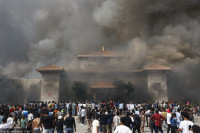Kathmandu
KMC plans to test quality of milk
Samples of all kinds of milk, packaged and those delivered by farmers, will be tested.
Post Report
Kathmandu Metropolitan City plans to test all kinds of milk consumed in the city.
Dr Awadesh Jha, chief of the metropolis’ Department of Agriculture and Animal Husbandry, said his office plans to collect samples of milk, both packed and those delivered by farmers, and examine them in the laboratory of the Department of Food Technology and Quality Control.
Jha said the metropolis is also setting up its own laboratory to test food products being sold in the market for their quality.
Testing milk and other food products is among the measures the metropolis is planning for public safety, officials said.
“Most people, including children, elderly and sick people, consume milk thinking that it is good for health but most of us don’t know its quality,” Jha said. “Ensuring the quality of milk and other food products is our responsibility.”
Officials said that the metropolis will check milk for its quality, hygiene, adulteration, and physical and chemical characteristics.
Earlier, in monsoon, the metropolis had tested the quality of jar water distributed by several companies, which was found contaminated with deadly microbes.
Officials said that testing the quality of milk and water is among the measures the city has taken recently to improve service delivery. Officials cited household waste segregation drive as another such measure.
Besides, the city office is preparing to microchip all dogs kept as pets by the metropolis’s residents. Officials hope that microchipping the dogs will help pet owners locate their animals when they get lost. The measure also aims to hold owners accountable if they abandon their pets.
Pet microchips are tiny devices that are inserted under a pet’s skin. Officials say the chip can be scanned and information about the owner stored in it accessed easily.
Jha said the measure would discourage owners from abandoning their pets when they get old or sick. Officials estimated that there are around 20,000 pet dogs in the 32 wards of the metropolis.
The metropolis warned that it can slap a fine of up to Rs5,000 to owners who release their pets on streets to defecate but do not clean it up afterwards.
The KMC has sterilised over 4,300 dogs in the last two months. Nine different organisations have joined hands in the effort. Around 12,000 dogs have been administered the anti-rabies vaccine and the vaccination programme will continue, officials said.
The KMC has also set up a shelter where injured and violent stray dogs will be housed. Officials said that the metropolis has already constructed a shelter for around 50 dogs and has ordered another to accommodate an additional 100 dogs.




 17.12°C Kathmandu
17.12°C Kathmandu









